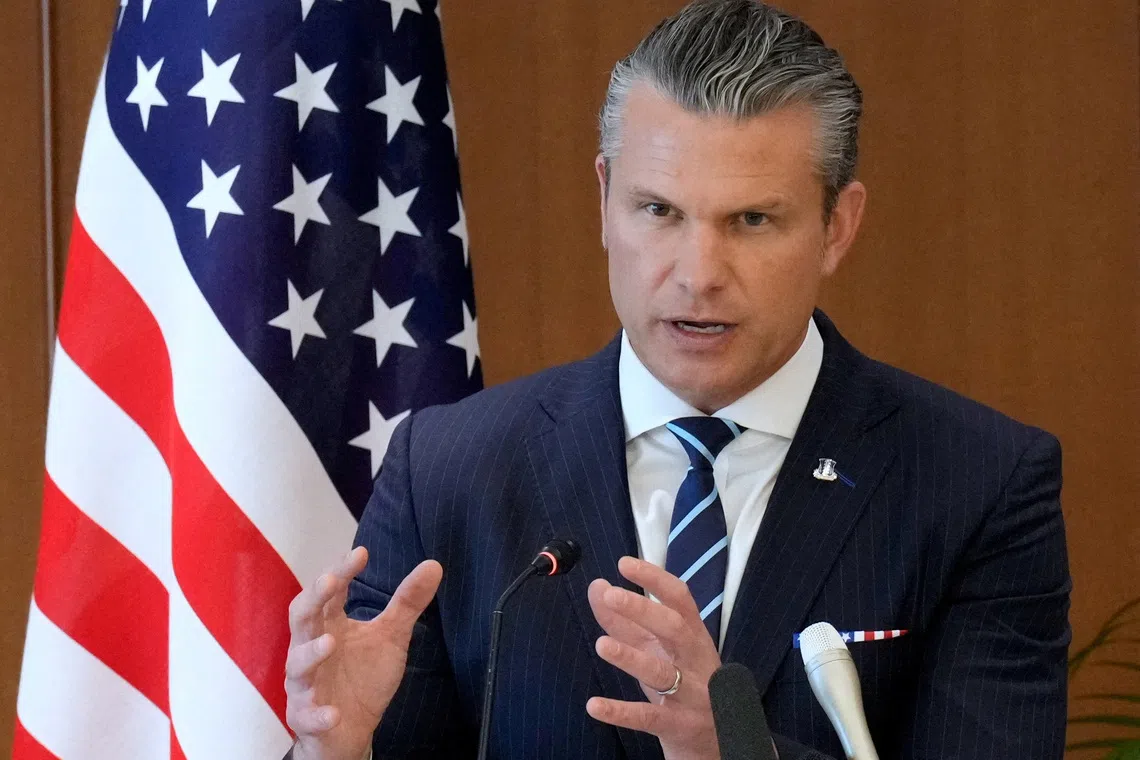US will ‘stoutly defend’ its interests, defence secretary Hegseth tells China
Sign up now: Get ST's newsletters delivered to your inbox

US Defence Secretary Pete Hegseth also said he raised concern about China’s actions towards Washington’s regional allies and partners.
PHOTO: REUTERS
Follow topic:
KUALA LUMPUR - The United States will “stoutly defend its interests”, Defence Secretary Pete Hegseth told Chinese counterpart Dong Jun during a meeting on Oct 31 in Kuala Lumpur, flagging the importance of maintaining a balance of power in the region.
The meeting, following a September teleconference, was the latest sign of gradually improving defence communication between the two sides, amid roiling regional tension and increased military deployments across East Asia.
Mr Hegseth told the Chinese Minister of National Defence that the US was concerned about China’s activities in the disputed South China Sea and around Taiwan, he said in a post on X that described their meeting as “good and constructive”.
“We will continue discussions with the People’s Liberation Army on matters of mutual importance,” he wrote after they met on the sidelines of a gathering of Asean defence ministers in the Malaysian capital.
“The United States does not seek conflict,” he added. “It will continue to stoutly defend its interests and ensure it has the capabilities in the region to do so.”
China’s Defence Ministry said Mr Dong had told Mr Hegseth the US must exercise caution in both words and actions over Taiwan and take a clear stance against its “independence”.
The ministry quoted Mr Dong as saying China was committed to peaceful development while resolutely safeguarding national security interests.
“It possesses the full capability to respond calmly to any infringements or provocations,” it added in a statement.
The remarks came after US President Donald Trump said on Oct 30 that Taiwan did not figure in his meeting with Chinese President Xi Jinping
China has been steadily boosting air, naval and coast guard deployments around democratically governed Taiwan, which it claims as its own.
It considers Taiwan President Lai Ching-te a “separatist”. Mr Lai rejects Beijing’s sovereignty claims, saying only the island’s people can decide their future.
Mr Hegseth also said he raised concern about China’s actions towards Washington’s regional allies and partners, in apparent references to repeated clashes with the Philippines in the South China Sea and tension with Australia over surveillance flights.
The Pentagon has been pushing for improved communications with China over its military modernisation and regional posture, including greater transparency over its nuclear weapons build-up and more theatre-level discussions with military commanders.
The Chinese Defence Ministry said Mr Dong had told Mr Hegseth that the Trump-Xi meeting had provided “strategic guidance” to improve defence ties, and “practical steps” should now be taken.
In a summary of September’s video call, Mr Hegseth said he told Mr Dong the US did not seek conflict with China nor was it “pursuing regime change or strangulation” of China.
Shortly before meeting Mr Xi, Mr Trump said that he had o rdered the US military to resume nuclear testing
Mr Trump has described China as a “distant third” behind Russia as a nuclear power, but said it would be equal within five years. REUTERS

